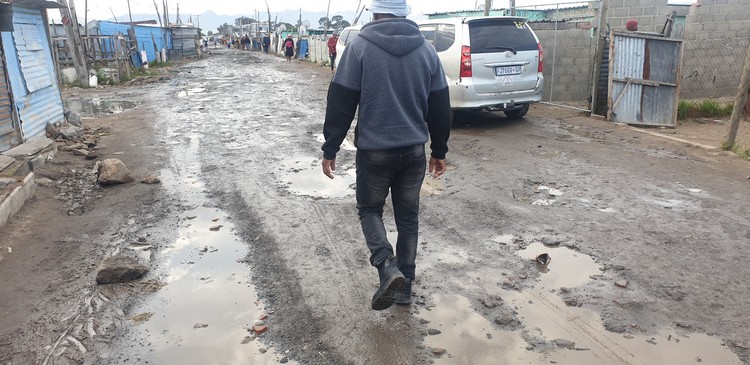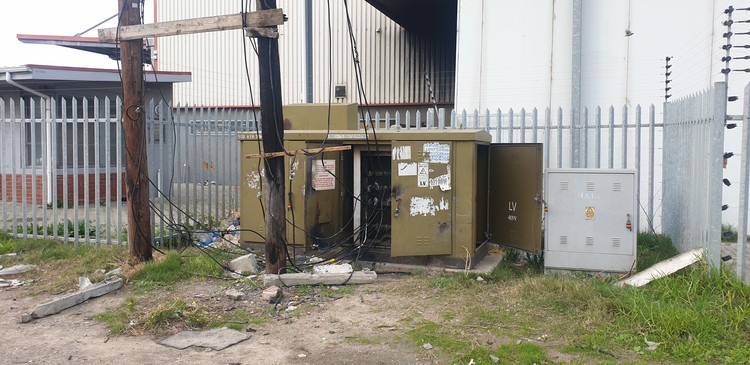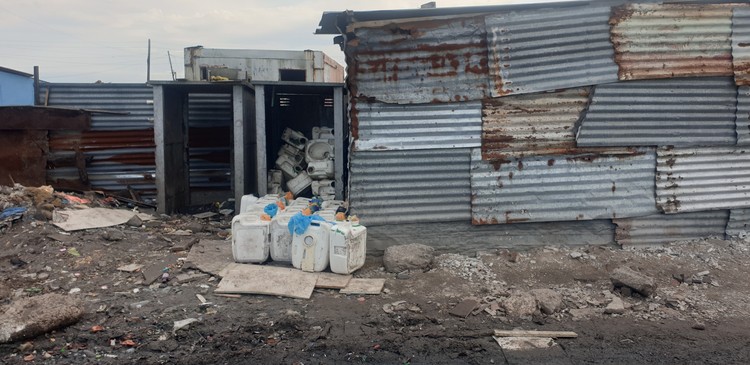Marikana families remain in the dark five years after landmark ruling
City of Cape Town says its still in the process of buying the parcels of land where about 40,000 people live in Philippi East
Community leader Loyiso Nqintiza walks through the muddy pathways in Marikana. He was among the first to move onto the land now known as Marikana informal settlement in Philippi East in 2014. Photo: Mary-Anne Gontsana
-
Nearly five years have passed since a court ordered the City of Cape Town to buy the parcels of land where Marikana informal settlement in Philippi is built.
-
SERI, which has been instrumental in residents’ legal battle against the City, says they too have been kept in the dark about purchase progress.
-
The City confirmed that the sale is underway and only once completed will it “prioritise the enhancement of basic services”.
Illegal electrical connections criss-cross between thousands of shacks made of mostly zinc and wood at Marikana informal settlement in Philippi East. Residents here say they have no choice but to rely on illegal “izinyoka” connections.
Five years have passed since a landmark judgment, ordering the City of Cape Town to buy the Marikana land from several private owners. At the time of the matter, Marikana was home to about 60,000 people. The judge noted that the occupants had “settled on these properties out of desperation”. She said if the City is unable to afford to purchase the land, the national and/or provincial ministers of housing were ordered to provide the funds.
Residents say they have been in the dark about progress to acquire the land. Once under the City, it will only then be obligated to provide residents with basic services like electricity, water and adequate sanitation.
Walking through Marikana this week, we were shown a charred transformer with a number of electrical wires coming out of it. These wires snaked up two wooden poles and then fanned out above the shacks.
We were also taken to a shack where, earlier this month, a man known as Zizi was electrocuted by one of the overhead cables while he was dismantling the structure.
“While he was on the zinc roof, he mistakenly touched one of those live wires on that pole next to his shack,” said Yoliswa Changa who lives next to Zizi’s shack.
Changa, who relies on an illegal connection, said that while the situation was not ideal, they “have no choice because there is no electricity”.
She said many people’s electrical appliances were getting damaged by the illegal wiring. “Everyday using this electricity you’re running the risk of having plugs randomly blowing up, or your things just stop working,” said Changa.
“This is what is happening in Marikana,” says Loyiso Nqintiza. “There is no electricity, so people find the nearest danger [transformer] and get electricity from it illegally.”
Nqintiza is a community leader and was one of the first to move onto the land in 2014. He is also a member of Asivikelane, an initiative that supports and advocates for the rights of people living in informal settlements. He said about 40,000 people currently lived in the settlement.
One of the transformers in Philippi East with illegal connections
Nqintiza explained that there are parts of Marikana that are completely dark overnight because the mast lighting is broken and there are no illegal connections.
Eskom is currently the service provider in the area. The company blamed the frequency of overloaded network incidents and equipment failures in Philippi on illegal connections and vandalism that has affected the electricity supply to Eskom customers.
“The illegal connections are overloading transformers, putting the Eskom network under severe strain and leaving legal paying customers frustrated due to the intermittent loss of electricity supply,” Eskom said.
“Unfortunately, Eskom cannot electrify Marikana as these residents occupy private land. Electrification of the area is the solution but only once an area is proclaimed to be developed.”
Poor sanitation
Sanitation is also a problem in Marikana. Some residents use chemical flush toilets and others use small white portable toilets. Residents say some of these toilets no longer work.
“We need proper services. As community leaders we try to make sure that we keep our area clean, but there are many things working against us. No electricity leads to more crime, illegal connections result in deaths, and we need proper toilets,” said Nqintiza.
He said residents needed a meeting with municipal officials to update them on steps to comply with the court order.
An empty toilet stall is filled with dirty portable toilets in Marikana.
The Socio-Economic Rights Institute of South Africa (SERI) has been instrumental in the legal battle against the City. Senior attorney at SERI, Thulani Nkosi, said that the City was to pay the purchase price for the parcels of land. He said the arbitration process had taken place even though the residents and their legal representatives were not allowed to observe proceedings.
“The City took a view that the issue was between it and the landowners. We later heard that the arbitration process had fixed the price and that the City was going to buy the lands. We do not know the exact details despite trying to get information through the City’s legal team,” he said.
The City’s Mayco Member for Human Settlements Malusi Booi, confirmed that the City is in the process of purchasing the land.
“Legal processes are taking place for the transfer of property. [Then] the City will prioritise the enhancement of basic services to this community.” The City did not provide any details on the sale price for the properties.
Support independent journalism
Donate using Payfast

Don't miss out on the latest news
We respect your privacy, and promise we won't spam you.
© 2022 GroundUp. This article is licensed under a Creative Commons Attribution-NoDerivatives 4.0 International License.
You may republish this article, so long as you credit the authors and GroundUp, and do not change the text. Please include a link back to the original article.
We put an invisible pixel in the article so that we can count traffic to republishers. All analytics tools are solely on our servers. We do not give our logs to any third party. Logs are deleted after two weeks. We do not use any IP address identifying information except to count regional traffic. We are solely interested in counting hits, not tracking users. If you republish, please do not delete the invisible pixel.



